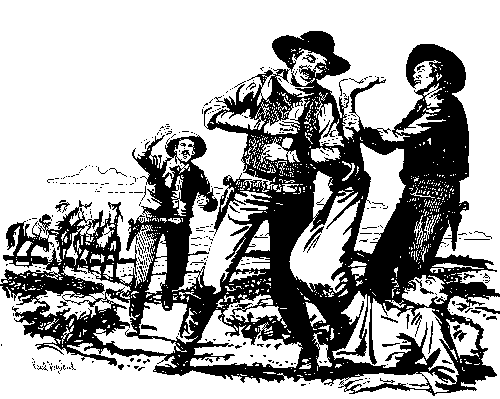|
[Index] Better Than Fingerprints Some people didn't cotton to him when they first met him. An accidental explosion had permanently blackened half his face and left him with one eye. Given time, though, most everyone discovered that George Washington Mardis was honest, generous, and likeable. His parents had given him a fine sounding name but he was known to all as "Old Allegheny," a nickname hung on him because he kept up a running account of the merits of the Allegheny Mountains back in Pennsylvania where he was raised. Well known in mining camps of northeast Nevada, Mardis discovered placer gold in a creek near present-day Charleston in 1876. The stream was named 76 for the year gold was discovered and the nearby mining camp that grew from the sagebrush was christened "Mardis" (renamed Charleston in 1895). Flushed with success, Allegheny took on a new wife. She insisted he get out of the prospecting business declaring it was too uncertain to make a dependable living. Mardis went into the freighting business and was away from home even more but he was making steady money. September 10, 1880 was a hot day as Allegheny hitched up his freight outfit for the long haul from Gold Creek to Elko. Stuffed in his vest pocket were $250 in gold coins and a list of supplies for the town's Chinese camp. He hauled himself up and onto the hard wooden seat and yelled to his mules to start pulling. His demand, punctuated by a whip crack, prompted the animals to dig shod hooves into the dusty road and head south. About five miles out "New York Charley" stepped from behind a clump of willows and called to Allegheny to stop. Mardis squinted through his one good eye and saw that Charley had a gun in his hand. Not ready to argue with a pistol, the freighter pulled back on the reins as he pushed the wagon brake with his foot. Charley told him to fork over the gold he was carrying. Mardis knew it was no secret that he was taking some cash to Elko but he thought he might be able to talk his way out of the situation. He dug into a vest pocket, pulled out a plug of chewing tobacco, and told the gunman that the "chaw" was all he had on him. Charley began pulling the trigger. Allegheny took four slugs in his body, slumped forward and fell from the wagon onto the ground. He raised himself on an elbow clawing to get the pistol in his belt. His movements were too slow and the bandit was on him before his bloodstained hand could reach the worn grip on his six-shooter. A knife blade flashed in the sunlight as two slashes, one to the neck, ended the life of George Washington Mardis. Some hours later a buckaroo saw the wagon and team near some willows. The mules were still in harness. Recognizing the rig the cowboy trotted his horse over to pass the time of day with Allegheny. Instead, he found the freighter's crumpled body. Knowing the old man was beyond help he dug spurs into his horse and headed for town at full gallop. A few minutes later an impromptu posse thundered out of the camp. Searching the area for clues one of the men found barefoot prints heading toward Gold Creek. He called to the others. One of the men stepped down from his saddle to take a good look at the footprints and told the other men that he knew who had killed their friend. Racing back to Gold Creek they rode into Chinatown, right up the door of Charley's shack. Drawing their pistols they battered their way into the hovel and dragged Charley out. Some of the posse held him while a couple of others removed Charley's shoes.
"My Gawd! Lookit that! He's got six toes on each foot!" bellowed one of the men. Charley knew the jig was up. He was not going to get any mercy from the snarling, angry friends of Allegheny. He confessed. In unison, many hands reached for saddle ropes. Several Chinese elders stepped from the crowd of onlookers and one held up his hand asking them to stop. After an earnest plea from the Chinese delegation who reasoned that Charley had stolen their money, the posse surrendered the slayer to his own people who promised quick justice. The killer was hustled off to face his countrymen in an unofficial court. A few hours later the funeral procession carrying George Washington Mardis to his final resting place in the town's graveyard left the outskirts of Gold Creek. Several hundred feet away a similar cortege issued from Chinatown and moved toward the Chinese cemetery. They bore the remains of "New York Charley" the cold-blooded killer who left clues no one else could leave.
14 April 1998
Sources: Elko Independent, September 12, 1880; Nevada's Northeast
Frontier, Edna Patterson, Louise Ulp, and Victor Goodwin; Nevada
Postal History, 1871 to 1972, Robert P. Harris;
Nevada Ghost
Towns and Mining Camps, Stanley Paher; and Pioneer Nevada, Volume
II, Harold's Club, Reno, Nevada.©1998
by Howard Hickson. If any portion or all of this article is used or quoted
proper credit must be given to the authors.
|
